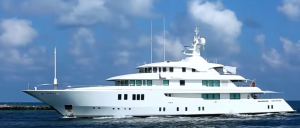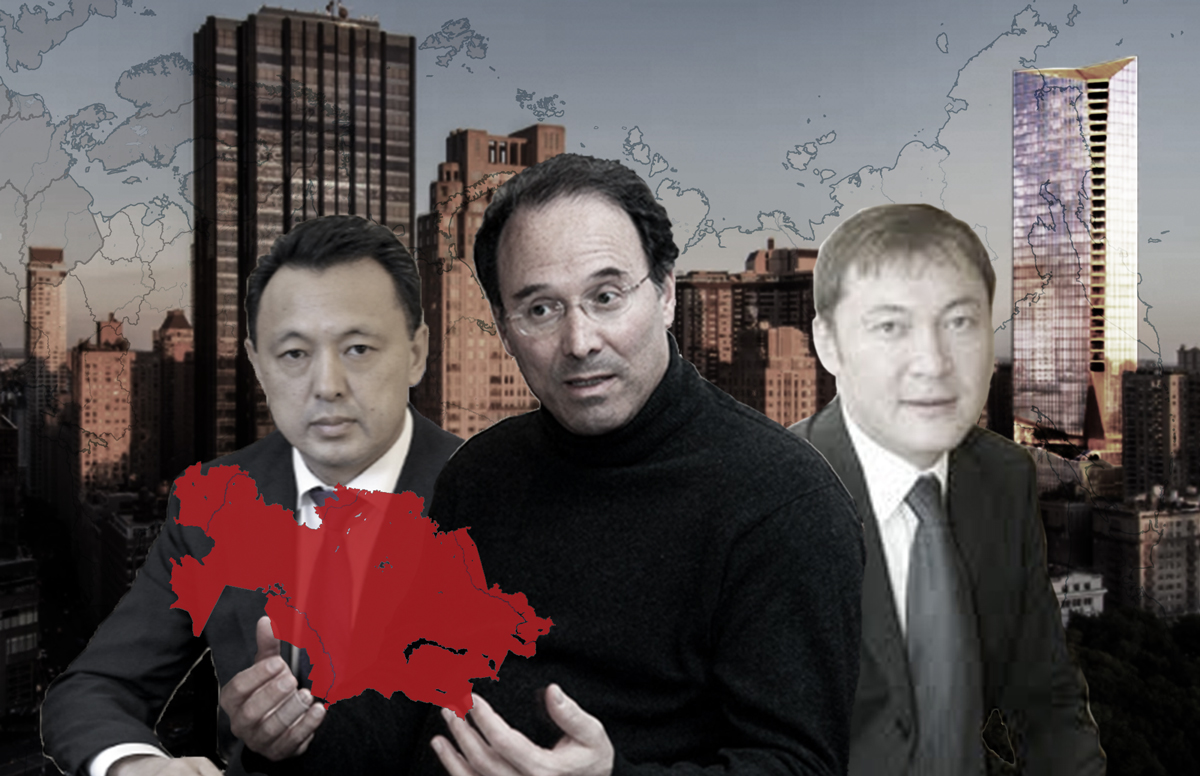Party Girl once went by a different name.
The 205-foot, eight-cabin yacht once belonged to Askar Alshinbayev, a Kazakh energy and banking tycoon who sold it in 2016. Alshinbayev, according to yacht enthusiast website SuperYachtFan, had given the vessel a less provocative moniker: Meridian.
More interesting than the vessel itself is the inspiration for its name, private equity fund Meridian Capital Limited. The Bermuda-incorporated entity, with operations in London and Hong Kong, is linked to some of Kazakhstan’s wealthiest individuals and has invested in mining, oil, and infrastructure projects across the globe. It was also behind Russia’s largest ever real estate deal in 2012, selling a shopping mall in St. Petersburg to Morgan Stanley for $1.1 billion.
Another notable investment for Meridian: Its bet on Gary Barnett’s Extell Development.
According to an analysis of property records by The Real Deal, Meridian has invested more than $200 million into Extell’s latest New York real estate projects. The relationship appears to have started in 2011. That year, Barnett acquired a site at 16-18 West 57th Street, and a Meridian-linked entity called “Bremsten Finance” assumed the developer’s $65.5 million mortgage. The same year, Meridian acquired the debt on Barnett’s development site at 3 West 46th Street, a $10.3 million loan originally held by Anglo-Irish Bank, as well as the $19.3 million in debt on Barnett’s 570 Fifth Avenue just around the corner, city records show.
Last September, TRD reported Meridian, through its Hong Kong-based division, took a $127 million equity position in Extell’s condo tower at 50 West 66th Street. The deal not only made Meridian one of Extell’s biggest known equity investors, it also appears to be the biggest known Kazakh investment in New York real estate. Real Capital Analytics, which tracks global capital flows in the real estate industry, doesn’t even have any U.S. commercial real estate investments from the Central Asian nation in its current database, the company said.
“It’s a little bit unusual from the point that it’s one investment of that size [$100 million plus], but there are plenty of Kazakh investors investing all over the United States,” said Ed Mermelstein, a real estate attorney who has represented several Kazakh clients in New York deals. “Maybe not $100 million at a time, but they’re making $5, $10, $20 million dollar [real estate] investments all over the place.”
Extell did not respond to several requests for comment for this story. The firm’s development partner on the 66th Street project, Sam Sidhu’s Megalith Capital, declined to comment. Representatives for Meridian could not be reached.
An oligarch labyrinth
At the time of the Meridian’s investment in 50 West 66th last year, one of its investors—Sauat Mynbayev, the CEO of Kazakhstan’s public oil and gas company KazMunayGas and the country’s former energy minister—had just been exposed in the Paradise Papers, the massive leak of offshore financial documents from law firm Appleby. At first, Mynbayev denied being a shareholder in the firm, but later admitted it, telling Radio Free Europe in November that “I declared my ownership share in Meridian Capital in a tax declaration, which I submitted over many years, as a public official should do, and I have never concealed this.”
Meridian has been so secretive about many of its operations that it even refused to provide Appleby key information about its ownership structure, according to a report from the Organized Crime and Corruption Reporting Project (OCCRP). But the company has clear ties to a number of other Kazakh oligarchs.
U.K. regulatory documents filed last year suggest Meridian is controlled by yacht aficionado Alshinbayev — who Forbes placed among Kazakhstan’s 10 richest people in 2014 — along with two alumni from the country’s largest private bank, Kazkommertsbank: Yevgeniy Feld, who also made the Forbes list, and Nurzhan Subkhanberdin, one of the bank’s original founders and a reported friend of Kazakh President Nursultan Nazarbayev (a recent report states Subkhanberdin no longer owns any shares in the bank). As it happens, the bank is set to merge with Halyk Bank, a company controlled by the president’s daughter, Dinara.

“Merdian,” flying the flag of Bermuda, in Fort Lauderdale, FL in 2015. The boat is now called Party Girl. (Credit: ZipZapPower)
Many of Meridian’s investments were backed by Kazkommertsbank, according to OCCRP. The financial institution has required multiple bailouts over the last few years, including a $7.5 billion rescue in 2017.
“According to an email from a central bank official,” OCCRP reported, “whenever a project failed, the bank owners and executives — who were also Meridian’s owners — would dump the losses onto the bank’s balance sheets.”
As for Mynbayev, he negotiated numerous oil and gas deals for the Kazakh state while Meridian increased its stakes in various global energy assets — though he maintains that the company made no deals with the government while he was minister. While he owned 19 percent of Meridian in 2006, OCCRP could not determine his current stake.
Clay Fuller, a foreign policy scholar who studies dictatorships and corruption at the American Enterprise Institute, considers Kazakhstan a kleptocracy. In such states, he said, “the structure of rule is based on exchange of private goods amongst elites. So they bribe each other off.” Kazakh investors have been caught up in money laundering lawsuits implicating major U.S. real estate projects developed by the likes of the Trump Organization and the Chetrit Group.
Rapprochement
Meridian’s investment in New York real estate isn’t totally unexpected. In 2015, Kazakhstan’s president Nazarbayev hosted a dinner at the Four Seasons in Midtown with the heads of major U.S. private equity firms such as KKR, Carlyle Group and Blackstone Group in attendance. His country’s sovereign wealth fund was prepared to invest $93 billion globally, he announced there, including into real estate.
Kazakhstan’s overtures to the West have come with a greater spotlight on its financial and political misdeeds. Mukhtar Ablyazov, a political rival of Nazarbayev, was sentenced in June to 20 years in prison in Kazakhstan (though he’s believed to be living in France). He was accused of embezzling $6 billion from BTA Bank (partially owned by Kazkommertsbank) and is also under investigation for the 2004 murder of Kazakh banker Yerzhan Tatishev.
The scandal has made its way to American shores: In 2014, BTA Bank accused Ablyazov associate Viktor Khrapunov of laundering stolen cash into millions of dollars of U.S., Middle East and European assets. A Financial Times investigation found that some of Khrapunov’s funds went toward the purchase of three condos at Trump Soho. (When later asked if there was Kazakh money in the tower, President Trump said, “No idea. Really no idea.”)
A separate lawsuit in 2015 alleged Ablyazov laundered money into the Chetrit Group’s Flatotel development at 135 West 52nd Street and Cabrini Medical Center at 227 East 19th Street. The suit has since been settled.
In response to some of the corrupt practices, Nazarbayev launched an anti-corruption campaign, which according to Kazakh news site Tengrinews, called for “radical eradication of legal nihilism in the society.” The president enlisted former British Prime Minister Tony Blair to serve as a kind of lobbyist-advisor for the country’s Western public-relations push, though he has since left the position.
Mermelstein believes concerns over corruption and money laundering are largely politicized. Kazakhstan’s issues will become less of a concern for U.S. regulatory authorities, he believes, as the two countries forge closer political and economic ties and transparency increases.
“Kazakhstan several years ago aligned [itself] more with the United States and has been a very strong partner and provided an economic pipeline to the U.S.,” he said. “Those types of relationships are what eventually transcends this issue of money laundering.”
The U.S. government and Kazakhstan have indeed strengthened ties in recent years. In January, Trump invited Nazarbayev — who once won 98 percent of the vote in an election that was highly criticized by Western monitor groups — to the White House. Trump called the country, which supports nuclear non-proliferation, “a valued partner in our efforts to rid the Korean peninsula of nuclear weapons.”
On the whole, more Kazakh investment in New York City real estate is expected, said Petro Zinkovetsky, a real estate attorney who has worked with residential buyers from the country. One of his clients recently decided to amass a commercial portfolio, he said — the first such client he’s had with more on the mind than another stash pad in a sleek new condo tower.
“The different thing about Kazakhstan from a lot of other post-Soviet states is the government compared to the other republics in the region — Turkmenistan, Tajikistan, etc. — was very stable,” Zinkovetsky said. “And I see the investors are getting a lot more sophisticated when it comes to investing in U.S. real estate than they were before.”
As far as Extell’s 66th Street project, not much else regarding Meridian’s relationship with the developer is known. The project itself has come under criticism from City Council member Helen Rosenthal, who claims the developer misled the public about the tower’s scale. Originally filed with the Department of Buildings as a 262-foot building, Extell acquired air rights and increased the planned height to 775 feet last fall.
